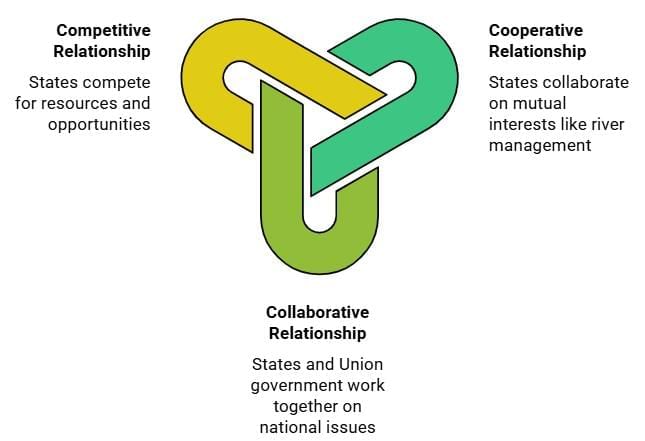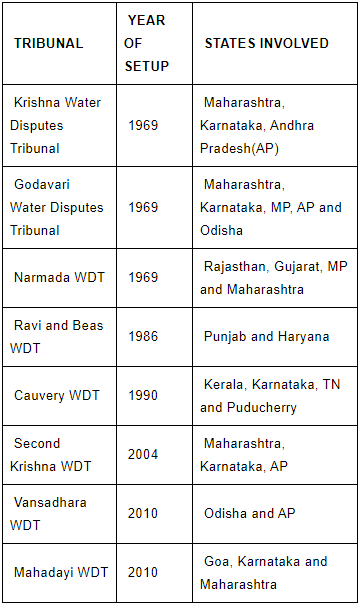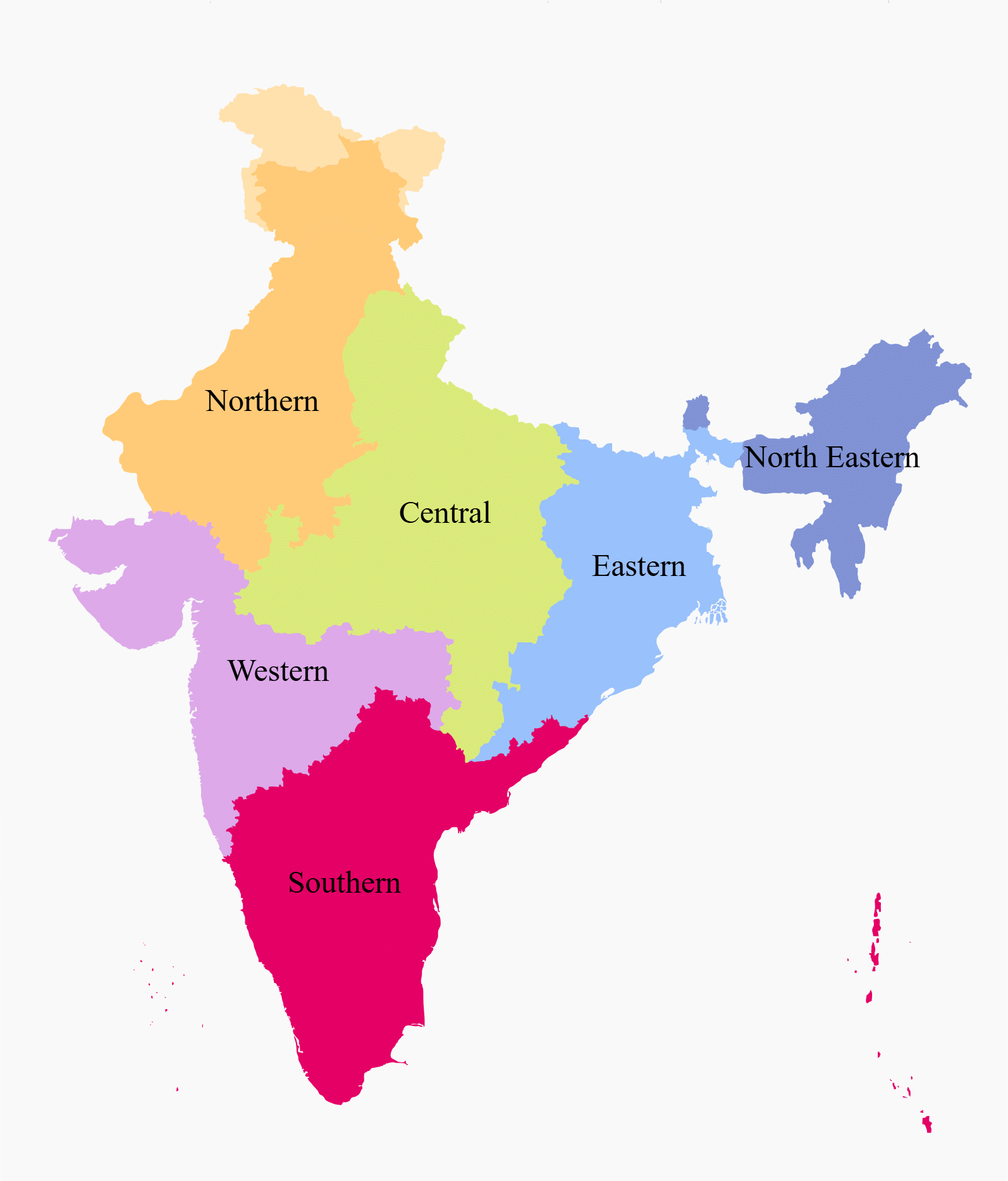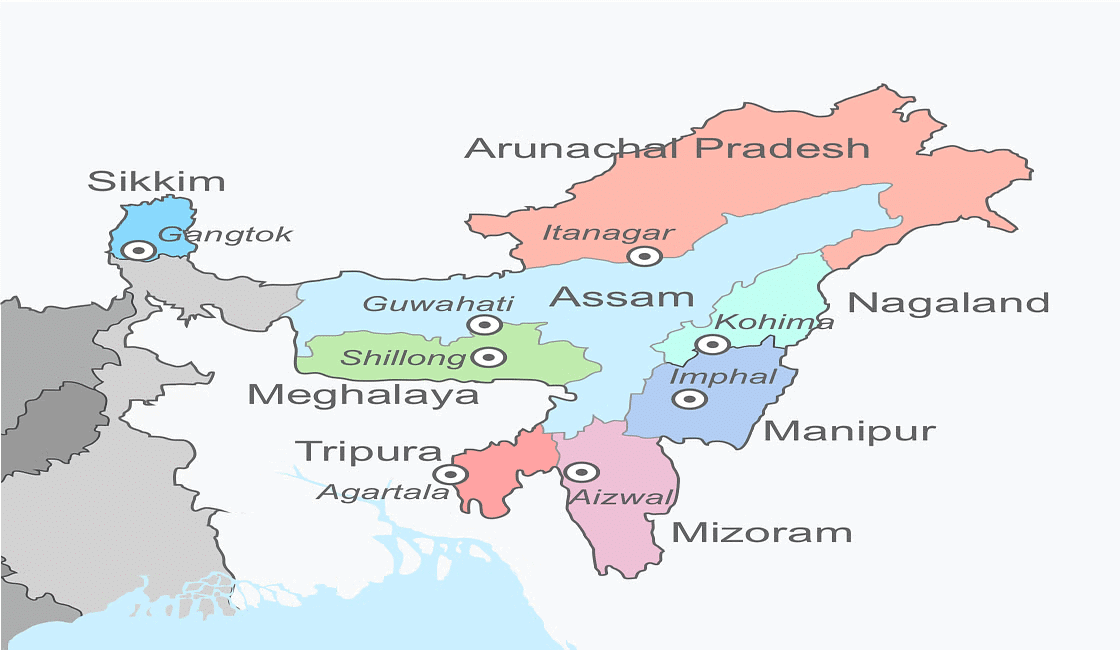Inter-State Relations | Indian Polity for UPSC CSE PDF Download
| Table of contents |

|
| Introduction |

|
| Nature of Inter- State Relations |

|
| Inter State Water Disputes |

|
| Inter - State Councils |

|
| Inter State Trade Commerce |

|
| Zonal Councils |

|
| North Eastern Council |

|
Introduction
Inter-State relations in India refer to the relationships and interactions between the federal units- states and union territories of India.
Part XI of the Indian Constitution deals with administrative relations, while Part XIII focuses on trade and commerce.
Generally, the relationship among the states in India is cooperative, enabling them to collaborate on implementing national policies, programmes, and addressing common issues. However, tensions can arise over matters like resource distribution and funding allocation.
Key Points
- Cooperative relations between states are crucial for the harmonious functioning of India's federal system.
- Thus, the Constitution makes provisions regarding mutual recognition of public acts etc., inter-state water disputes, inter-state trade and commerce and coordination between states through inter-state councils.
- Statutory zonal councils also promote inter-state cooperation and coordination
Nature of Inter- State Relations
The nature of inter-state relations in India is influenced by its federal system, which fosters a mix of cooperative, collaborative, and competitive interactions among state governments.
- Cooperative Relationship: States often cooperate on issues of mutual interest such as river water sharing, joint infrastructure development, and regional economic initiatives. Example: Agreements between states on river basin management. The Inter-State Council, as provided under the Constitution, serves to enhance such cooperation and coordination.
- Collaborative Relationship: States work together with one another and with the Union government on issues of national concern. Example: Joint efforts in disaster management, internal security, and foreign policy coordination. The National Development Council serves as a platform to support these collaborative efforts.
- Competitive Relationship: States also engage in healthy competition to secure better resources, investments, and opportunities for their populations. Example: Competing to attract industries, improve infrastructure, generate employment, and perform better on social indicators like literacy, health, and poverty alleviation.

Inter State Water Disputes
Article 262: Adjudication of disputes relating to waters of inter-state rivers or river valleys
- Parliament can create laws to resolve disputes or complaints regarding the use, sharing, and management of waters from interstate rivers and their valleys.
- Parliament may also specify that neither the Supreme Court nor other courts can handle such disputes.
- Under Article 262, Parliament has enacted two laws related to water disputes.
(a) The River Boards Act 1956
- Provides for establishment of river boards for the regulation and development of interstate river and river valleys
- Central government can establish a river board on the request of the states concerned
- Till date, no river board has been created
(b) The Inter-State Water Disputes Act 1956
- This act empowers the Central government to create a temporary tribunal for resolving interstate water disputes.
- Section 11 of the Act excludes the SC from jurisdiction in respect of water disputes referred to a tribunal under the Act
- The decision of the tribunal is to be final and binding
- The tribunal will have powers of a civil court, powers to make schemes for implementing its decisions, etc.
- The Inter-states River Water Disputes (Amendment) Bill 2017 is currently pending in the Parliament
- Till now, the Central government have set up tribunals, the Central government have set up 8 tribunals.
- It has agreed to set up a 9th tribunal for adjudication of dispute on Mahanadi River Waters between the states of Odisha and Chhattisgarh.
Inter- State Water Dispute Tribunals so far
Inter - State Councils
Article 263: Provisions with respect to Inter-State Councils
If at any time it appears to the President that the public interests would be served by the establishment of a Council charge with the duty of
(a) inquiring into and advising upon disputes which may have arisen between States;
(b) investigating and discussing subjects in which some or all of the states, or the Union and one or more of the states, have a common interest; or
(c) making recommendations upon any such subject and, in particular, recommendations for the better co-ordination of policy and action with respect to that subject.
It shall be lawful for the President by order to establish such a Council, and to define the nature of its duties to be performed by it and its organisation and procedure.
- The Councils duty is complementary to the SC's jurisdiction under Article 131 to settle disputes between the Union and the States or between States.
- The Council’s function is advisory, unlike the SC's which is binding
The President has established the following councils under Article 263:
(a) Central Council of Health
(b) Central Council of Local Government and Urban Development
(c) Four Regional Councils for Sales Tax for Northern, Eastern, Western and Southern Zones
Sarkaria Commission on Centre-State relations strongly recommended the establishment of a permanent Inter-State Council under Article 263
- To be called Inter-Governmental Council
- To discharge duties enumerated in Article 263 (b) and 263 (c)
VP Singh (Janata Dal) government established the Inter-State Council in 1990.
Members
(a) PM (Chairperson)
(b) Chief Ministers of all States
(c) Chief Ministers of UTs having legislative assemblies
(d) Administrators of UTs without legislative assemblies
(e) Governors of States under President's Rule
(f) Six Central cabinet Ministers, including Home Minister, rest nominated by the President
(g) 5 Minister of Cabinet rank/Ministers of state to be permanent invitees
- This Council to be a recommendatory body on issues relating to inter- state, Centre-state and Centre-UT relations
- Promote coordinating
- It can also deliberate upon other matters referred to it by the Chairperson
- Council has to meet at least thrice a year
- Meeting to be held on camera
- All questions to be declared & decided by consensus
Council set up a Standing Committee in 1996 for continuous consultation
Members
(a) Union Home Minister (Chairperson)
(b) 5 Cabinet Ministers
(c) 9 CMs
1991: Inter-state Council Secretariat set up, headed by a secretary to the government of India, to assist the council
Public Acts, Records and Judicial Proceedings
- Jurisdiction is each state is its own territory only
- Thus, acts of one state may not be recognised in another
- To avoid such confusions, the Constitution has a 'Full Faith and Credit' clause (Article 261)
- Full faith and credit is to be given throughout the territory of India to public acts, records and judicial proceedings of the Centre and every state,
(a) "Public acts" includes both legislative and executive acts of the government
(b) "Public record" includes any official book, register or record made by a public servant in the discharge of his official duties - Parliament to determine, by Law, the manner in which and the conditions under which records and proceedings are to be proved and their effect.
- Final judgements and orders of civil courts in any part of India are capable of execution within India without the necessity of a fresh suit upon the judgement.
Inter State Trade Commerce
- Articles 301-307
- Part XIII
- Deal with trade, commerce and intercourse within the territory of India
- Article 301: Freedom of trade, commerce and intercourse and guarantees freedom from all restrictions except those provided in other provisions of the Constitution (Articles 302-305)
- Article 302: Power of the Parliament to impose restrictions on trade, commerce and intercourse between states or within a state in public interest
- Article 303: Restrictions on the legislative powers of the Union and of the states with regard to trade and commerce. Parliament and State legislatures cannot give preference to one state over another or discriminate between state unless there is a scarcity in any part of India
Article 304: Restrictions on trade, commerce and intercourse among States
- State legislature can impose reasonable restrictions upon freedom of trade, commerce and intercourse in public interest
- A bill for this purpose needs prior sanction of the President before introduction.
- State legislature cannot give preference to one state over another or discriminate b/w states.
- State legislature can impose on goods imported from other states or UTs to any tax to which similar goods manufactured in that state are subject. Discriminatory taxes cannot be imposed
Article 305: Saving of existing laws and laws providing for certain state monopolies
- The parliament or state legislature can make laws for carrying on any trade, business, industry or service, whether to the exclusion, complete or partial, of citizens or otherwise.
Article 306: Power of certain states in Part B of the First Schedule to impose restriction on trade and commerce (Repealed)
Article 307: Appointment of authority for carrying out the purposes of Article 301-304
- By Parliament
- So far, no such authority appointed
Zonal Councils
- These are statutory bodies under the State's Reorganisation Act of 1956
- The act divided the country into 5 zones i.e. Northern, Central, Eastern, Western and Southern and provided a zonal council for each zone
 Zonal Councils of IndiaFactors of consideration while forming zones(a) The natural divisions of the country
Zonal Councils of IndiaFactors of consideration while forming zones(a) The natural divisions of the country
(b) The river systems and means of communication
(c) The cultural and Linguistic affinities
(d) Requirements of economic development
(e) Security
(f) Law and order
Members of zonal councils: Have right to vote in meeting
(a) Union Home Minister (common Chairperson of all Zonal councils)
(b) Chief Ministers of all the States in the zone (VC for one year in rotation)
(c) Two other ministers from each state in the zone
(d) Administrator of each union territory in the zone
Advisors of zonal councils (without the right to vote)
(a) A person nominated by the Planning Commission (now NITI Aayog)
(b) Chief Secretary of each state government in the zone
(c) Development commissioner of each state in the zone
- Aim: To promote cooperation and coordination between states, UTs and the Centre discuss and make recommendations regarding matters like economic and social planning, minorities, border disputes etc . Only deliberative and advisory bodies
Objectives
- To achieve emotional integration of country
- To help arrest the growth of acute state- consciousness, regionalism, Linguist, and particularistic trends
- To help remove the after-effect of separation in new states the states so that the process of reorganisation, integration and economic advancement may synchronise
- To enable the Centre and state to cooperate with each other in social and economic matters and exchange ideas and experience in order to evolve uniform policies
- To cooperate with each other in the successful and speedy execution of major development projects
- To secure a level of political equilibrium between different regions of the country
North Eastern Council
- Created by the North-Eastern Council Act of 1971
- Members: Assam, Manipur, Mizoram, Arunachal Pradesh Nagaland, Meghalaya, Tripura and Sikkim
- Functions Like that of the other zonal councils
 North Eastern India
North Eastern India
Few additional functions
- Formulate a unified and coordinated regional plan covering matters of common importance
- Review periodically the measures taken by the member' states for maintenance of security and public order in the region
Headquaters of Zonal Councils
Issues in Inter-State Relations in India
Despite the cooperative federal structure, several challenges persist in inter-state relations. Key issues include:
1. Disputes over River Water Sharing
River water sharing disputes are a significant source of conflict between states due to water shortages and uneven distribution. Some prominent examples include:
- The Cauvery water dispute involving Tamil Nadu and Karnataka.
- The Narmada water issue between Maharashtra and Gujarat.
2. Conflicts over Language
Language conflicts have arisen, particularly concerning the use of Hindi as the official language. Non-Hindi speaking states often oppose the imposition of Hindi due to concerns about linguistic diversity and the need to protect regional identities.
3. Disputes over Boundaries
Boundary disputes remain unresolved in many areas, leading to conflicts between states. Some examples include:
- The village of Merapani claimed by both Assam and Nagaland.
- Belgaum, a contentious area between Maharashtra and Karnataka.
4. Disparities in Regional Development
Regional development disparities can create feelings of resentment among states. For instance, states like Gujarat and Maharashtra often feel they contribute significantly to the national economy but receive inadequate support in return.
5. Inter-State Armed Conflicts
Instances of inter-state armed tensions have occurred along state borders. For example, an incident involving Assam police firing during an operation against timber smugglers from Meghalaya escalated tensions along the Assam-Meghalaya boundary.
Way Forward: Strengthening Inter-State Relations
To foster a more cooperative inter-state environment, the following steps are essential:
1. Encourage Dialogue and Cooperation: Promote regular communication and negotiation channels among states to peacefully resolve disputes.
2. Address Developmental Gaps: Reduce regional imbalances through targeted investments and equitable resource distribution.
3. Reinforce Federal Mechanisms: Strengthen institutions like the Inter-State Council and Zonal Councils to mediate conflicts and enhance coordination.
4. Boost Economic Integration: Establish common markets, encourage inter-state trade, and create free trade zones to promote mutual dependence and benefits.
5. Promote Cultural Exchange: Encourage inter-state cultural initiatives to strengthen national unity and foster respect among different regions.
|
142 videos|779 docs|202 tests
|
FAQs on Inter-State Relations - Indian Polity for UPSC CSE
| 1. What is the importance of inter-state relations in the context of the Super TET exam? |  |
| 2. How does the concept of inter-state relations relate to the Super TET exam syllabus? |  |
| 3. Can you provide examples of inter-state relations that may be asked in the Super TET exam? |  |
| 4. How can knowledge of inter-state relations help in answering questions related to the Super TET exam? |  |
| 5. Are there any current affairs related to inter-state relations that I should be aware of for the Super TET exam? |  |
















